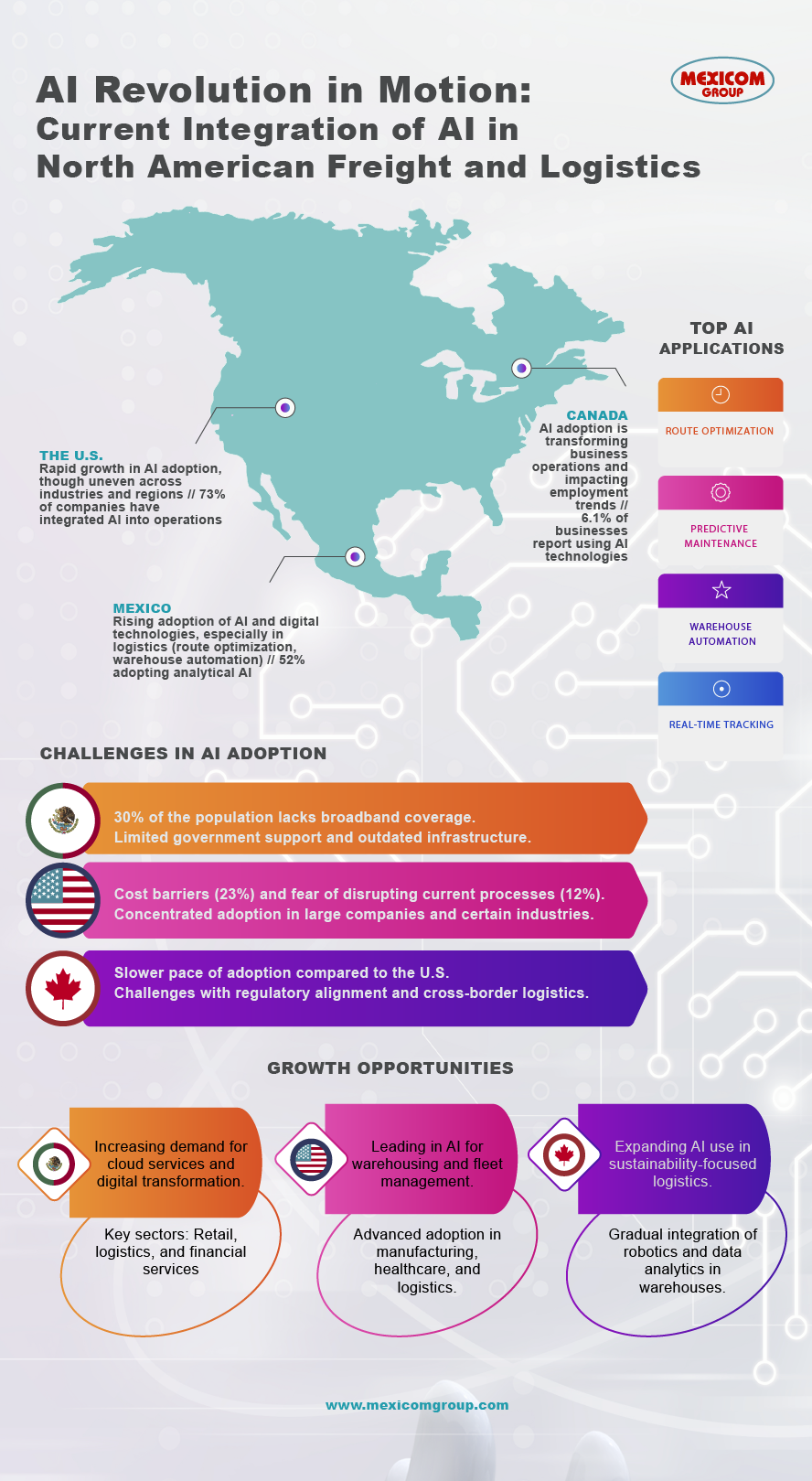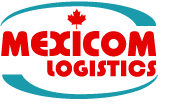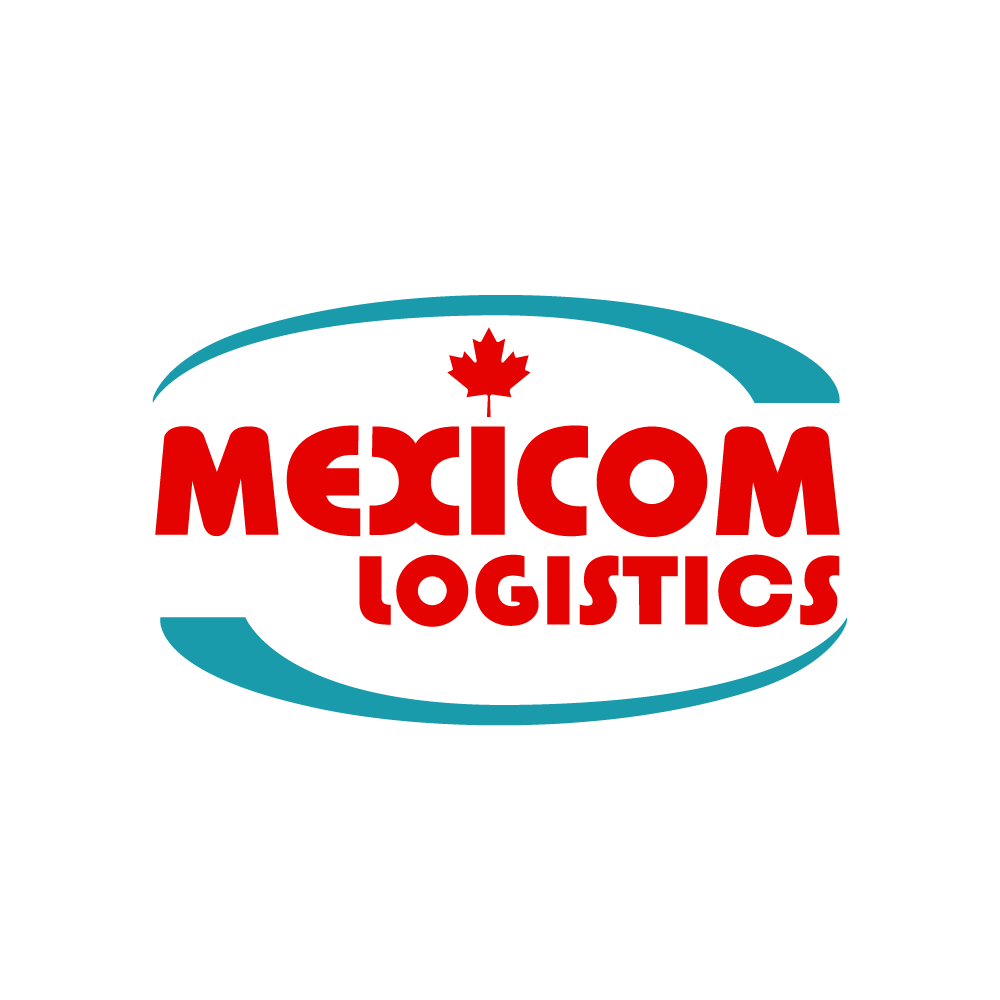AI Revolution in Motion: Current Integration of AI in North American Freight and Logistics
The use of artificial intelligence (AI) in the freight and logistics industry is becoming increasingly important and is almost inevitable. Companies are recognizing that AI can significantly improve operations and efficiency. With leaders in Canada, the U.S. and Mexico showing strong interest in AI investments, it’s clear that the entire North American region is moving towards more advanced technology solutions. As companies adapt to these changes, the logistics landscape is set to transform in the near future.
“A notable 50% of leaders in Mexico say AI use is “widespread” within their organization, meaning AI is used across departments and employees are trained on how to use it—higher than any other country surveyed. Canada (34%) and the U.S (38%) are not far behind, which may be due to the fact that 41% of North American leaders say they are quick to invest in the latest technology solutions, compared to 24% of European leaders. However, 80% of European leaders report that they plan to increase their investments in AI in the next year, suggesting it won’t be long until adoption is widespread regardless of region.“ – Samsara

Current AI Adoption in Mexico
In Mexico, the adoption of AI and digital technologies continues to rise, yet infrastructure and regulatory challenges limit their full potential. Businesses, especially in logistics, are leveraging AI for route optimization, predictive maintenance, and warehouse automation. However, outdated infrastructure and regulations remain hurdles. Companies recognize that AI adoption is critical to competitiveness and are focusing on enhancing operational efficiency and reducing costs. According to the “Innovation Landscape in Mexico and Central America 2023” by KPMG, data and analytics are seen as transformative for the next three years, with 80% of companies prioritizing these technologies. Additionally, 52% of firms are adopting analytical AI, and generative AI is expected to increase customer satisfaction (31%) and productivity (25%). Most companies also plan substantial product or service transformations over this period.
Despite the enthusiasm, the freight and logistics industry faces investment challenges, regulatory constraints, and limited government support, which keep it lagging behind other markets. The U.S. International Trade Administration estimates that about 30% of Mexico’s population lives in areas without broadband coverage, leaving these regions excluded from the digital ecosystem. “Internet accessibility reached only 4 out of every 10 households, with poorer states like Oaxaca, Chiapas, and Guerrero showing averages of just 1 out of every 10. This condition ranks Mexico among the lowest in OECD for Internet penetration, particularly in wireless broadband” (Mecinas, 2016).
Demand for cloud services and digital transformation solutions is expected to grow, especially among larger enterprises, while small and medium-sized businesses are still in early digitalization stages. Leading sectors driving digital technology adoption include retail, financial services, logistics (with warehouse automation), as well as lodging and food services, as reported by the Internet Mexican Association.
Current AI Adoption in the U.S.
AI adoption in the United States is progressing rapidly, but it is uneven across different industries and regions. According to a report from PwC, AI, including generative AI (GenAI), has become a top investment priority for U.S. businesses. Over the past 12 months, 55% of companies have invested in AI, making it the leading technological focus. Additionally, 73% of U.S. companies have already integrated AI into at least some parts of their operations, highlighting the growing role of AI in business strategy.
However, a study from MIT reveals that AI adoption is highly concentrated in large companies and certain sectors like manufacturing and healthcare. Kristina McElheran, the study’s lead author, points out that as early as 2017, only 6% of U.S. companies were using AI, and adoption has since been clustered in firms with more than 5,000 employees. In fact, more than 60% of companies with over 10,000 employees are now leveraging AI.
Sector-wise, manufacturing, information services, and healthcare lead the way, with about 12% of companies in these fields using AI, compared to just 4% in industries like construction and retail. The geographical spread of AI adoption is also noteworthy, as it’s not limited to the usual tech hubs. While AI is commonly used in cities like San Francisco, San Antonio, and Nashville, it is also gaining traction in unexpected areas, such as manufacturing hubs in the Midwest and Southern U.S. cities with fewer companies than the traditional technology epicenters of Silicon Valley, Boston, or New York.
These trends indicate that while AI is becoming a crucial tool for U.S. businesses, its adoption varies significantly depending on company size, industry, and location.
In the transportation and logistics sector, AI adoption is on the rise, with 34% of companies using AI for tasks like route optimization, according to a study by HERE Technologies and AWS. However, many companies still rely on basic data analytics, with 50% not yet utilizing more advanced technologies that could streamline operations and improve decision-making. Barriers to wider adoption include cost (23%), fear of disrupting current processes (12%), and challenges in identifying the right partners (11%).
Despite these challenges, progress is evident as 44% of logistics firms now use location data and IoT for real-time tracking and driver routing. This gradual integration of advanced technologies shows that while full AI adoption may be slow, companies are making strides toward improving efficiency and visibility in their supply chains.
Current AI Adoption in Canada
Canada The latest Canadian Survey on Business Conditions, conducted by Statistics Canada from April to May 2024, sheds light on the adoption of artificial intelligence (AI) across Canadian businesses. For the first time, the survey included questions specifically about the use of AI, aiming to understand its role in producing goods and delivering services. The findings reveal that 6.1% of businesses reported using AI technologies, with the most common applications being natural language processing (28.9%), followed closely by text analytics (27.0%), virtual agents or chatbots (26.5%), data analytics (25.0%), large language models (21.9%), and image and pattern recognition (21.8%). These technologies are transforming business operations, with AI adoption impacting both the tasks performed by employees and broader employment trends. The survey highlights a clear movement toward integrating AI in business processes, emphasizing the growing role of advanced technology in Canada’s economy.
Are Ground Freight & Logistics companies in Mexico, the US and Canada ready to fully utilize AI?
The readiness of ground freight and logistics companies in Mexico, the US, and Canada to fully utilize AI varies across countries and logistics aspects such as transportation, cross-border logistics, and warehousing. Here’s a breakdown:
Mexico
Transportation
Readiness: Growing adoption, but infrastructure challenges persist.
Companies are beginning to implement AI for route optimization and predictive maintenance. However, the lack of comprehensive digital infrastructure in some areas limits full utilization.
Cross-Border Logistics:
Readiness: Moderate; regulatory hurdles and technology adoption vary.
While AI can streamline customs processes and documentation, many companies face challenges related to cross-border regulations and inconsistent data sharing between countries.
Warehousing:
Readiness: Increasing, with some leaders investing in automation.
Warehousing operations are seeing advancements in automation and AI-driven inventory management. However, smaller companies may struggle with the upfront investment needed for these technologies.
United States
Transportation:
Readiness: High; leading in AI adoption.
Major logistics players are utilizing AI for fleet management, predictive analytics, and dynamic routing, making significant strides in efficiency and cost reduction.
Cross-Border Logistics:
Readiness: High; effective integration with Mexican logistics.
U.S. companies have more established systems for integrating AI in cross-border logistics, improving compliance and streamlining processes through AI-driven platforms.
Warehousing:
Readiness: Very high; significant investments in automation.
The U.S. is at the forefront of AI integration in warehousing, with automated systems, robotics, and AI for inventory management being widely adopted. Major retailers are leading this trend
Canada
Transportation:
Readiness: Moderate to high; steady adoption.
Canadian companies are adopting AI for route optimization and fleet management, though the pace is slower compared to the US. There is a strong emphasis on sustainability in AI applications.
Cross-Border Logistics:
Readiness: Moderate; ongoing improvements needed.
Companies are working to improve cross-border logistics with AI, but face challenges in regulatory alignment and data sharing with US partners, which hampers full integration.
Warehousing:
Readiness: Increasing; investments in automation are growing.
There is a gradual shift towards AI-driven automation in warehousing, with many companies exploring robotics and data analytics to improve efficiency. However, there remains a gap in widespread implementation compared to the US.
Overall, while there is significant momentum towards AI adoption in ground freight and logistics across Mexico, the US, and Canada, the readiness varies by country and logistics aspect. The US is leading in AI integration, particularly in transportation and warehousing, while Mexico and Canada are making progress but face specific challenges that may slow their full utilization of AI technologies.









